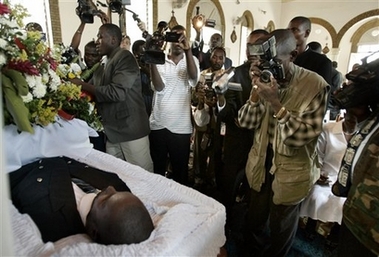|
| Correspond with us, including our executive editor, professor
Yves A. Isidor, via electronic mail: |
| letters@wehaitians.com |
| Want to send this page or a link to a
friend? Click on mail at the top of this window. |
 Must
learndly read, too; in part, of intellectual rigor; in part, the repository of ultimate
knowledge Must
learndly read, too; in part, of intellectual rigor; in part, the repository of ultimate
knowledge
|
| Posted Tuesday, February 13, 2007 |
| Terrorists violently silence photojournalist in Haiti |
 |
| Haiti's journalist shoot images of the funeral of the Haitian
photojournalist Jean-Remy Badio in Port-au-Prince, Monday, Feb. 12, 2007. Jean-Remy Badio
was shot to death at his home about 3 weeks ago in Martissant slum days after he
photographed gang members. (AP Photo/Ariana Cubillos) |
| Reposted Monday, February 12, 2007 |
| Posted Saturday, February 10, 2007 |
| Posted Tuesday, February 6, 2007 |
| FBI agents go to Haiti in kidnappings |
| By Trent Jacobs, Associated Press Writer |
PORT-AU-PRINCE, Haiti, Feb. 6, 2007 - Two FBI hostage negotiators were sent to Haiti on
Tuesday to help secure the release of a kidnapped American missionary, officials said.
Nathan Jean-Bieubonne, 58, a U.S. citizen of Haitian descent, was abducted Sunday
afternoon as he and three others drove home from church in Croix-de-Bouquets, a suburb of
Port-au-Prince, U.N. police spokesman Fred Blaise said.
FBI special agent Judy Orihuela said from Miami that Jean-Dieudonne's family requested
help in negotiating with his captors after the kidnappers contacted them and demanded a
ransom for his release. Authorities have declined to say how much the kidnappers sought.
U.N. police spokesman Fred Blaise said Jean-Dieudonne, whose hometown in the U.S. and
church denomination were not immediately available, apparently was unharmed and that his
family described him as being "in good spirits." Kidnappings for ransom surged
in the impoverished Caribbean nation last year but have fallen in recent weeks as a
9,000-strong U.N. peacekeeping force and Haitian police step up patrols around the
capital.
Foreign missionaries, who usually travel with less security than diplomats and
businesspeople, have increasingly become targets.
Most kidnappings are blamed on armed gangs that flourished in the aftermath of a
February 2004 revolt that toppled former president Jean-Bertrand Aristide, Haiti's first
democratically elected leader. Corrupt police officers have also been implicated.
| Posted Monday, February 5, 2007 |
| American missionary kidnapped in Haiti |
PORT-AU-PRINCE, Haiti, Feb. 5, 2007 - Armed kidnappers seized an American missionary as
he left his church near Haiti's capital and have demanded a ransom for his release, U.N.
police said Monday.
Nathan Jean-Bieubonne, a U.S. citizen of Haitian descent, was snatched Sunday afternoon
as he and three others drove home from church in Croix-de-Bouquets, a suburb of
Port-au-Prince, U.N. police spokesman Fred Blaise said.
The kidnappers surrounded Jean-Bieubonne's all-terrain vehicle and forced him out at
gunpoint while leaving the other three passengers, Blaise said.
"The men who kidnapped him are in touch with the family to demand the
ransom," Blaise said, declining to discuss the amount.
Blaise said a U.N. anti-kidnapping task force was working with Haitian police to
recover Jean-Bieubonne, whose hometown in the U.S. and church denomination were not
immediately available.
| Canada offers aid to quell violence in Haiti |
Canada offers aid to quell violence in Haiti Mon Feb 5, 12:20 PM ET
OTTAWA, Feb. 5, 2007 (AFP) - Canada will contribute 10 million Canadian dollars (8.45
million US) to help reform Haiti's national police and curb violence in the Caribbean's
poorest nation, officials said.
"Progress in police reform, gains in the fight against criminal gangs and an
overall reduction in violence will help lead Haiti on the path to peace and sustainable
development," Foreign Affairs Minister Peter MacKay said.
The funds will be used to construct a new police headquarters, equip police officers,
improve security in communities most affected by gang violence, counsel victims of
violence and launch new social programs to address poverty.
The monies are part of a 15 million dollar (12.7 million US) contribution previously
announced in June 2006 to support efforts in Haiti through the Global Peace and Security
Fund.
The Caribbean nation, which shares the island of Hispaniola with the Dominican
Republic, has been wracked by violence for two decades. More than half of Haiti's 8.4
million people live on one dollar a day, according to UN officials.
| Posted Thursday, February 1, 2007 |
| Wehaitians.com, the scholarly journal of
democracy and human rights |

